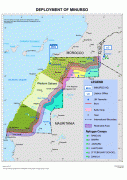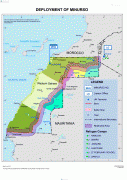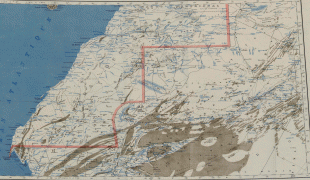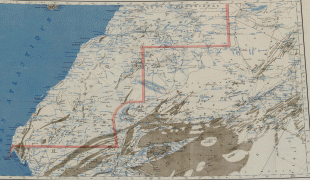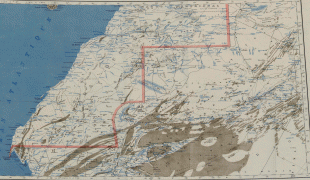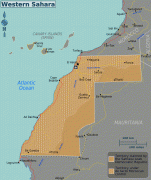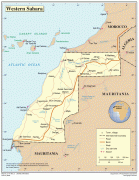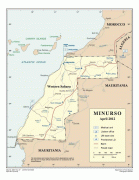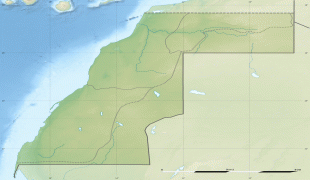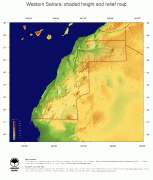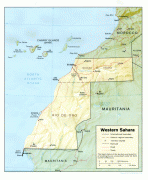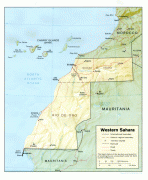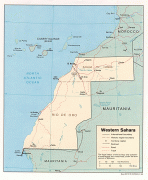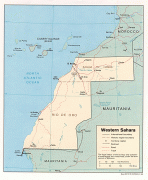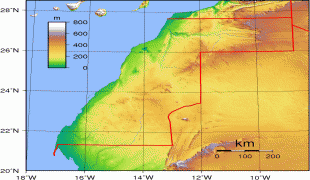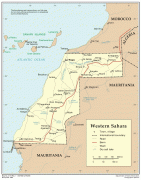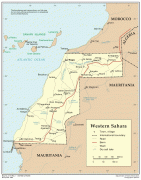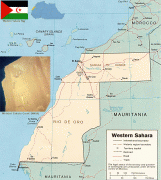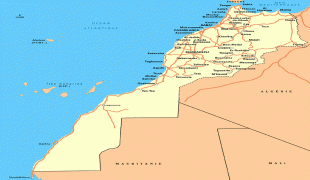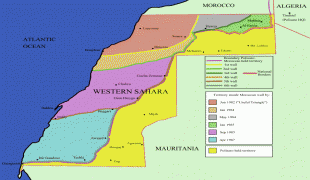Western Sahara (Western Sahara)
Occupied by Spain until 1975, Western Sahara has been on the United Nations list of non-self-governing territories since 1963 after a Moroccan demand. It is the most populous territory on that list, and by far the largest in area. In 1965, the United Nations General Assembly adopted its first resolution on Western Sahara, asking Spain to decolonize the territory. One year later, a new resolution was passed by the General Assembly requesting that a referendum be held by Spain on self-determination. In 1975, Spain relinquished administrative control of the territory to a joint administration by Morocco, which had formally claimed the territory since 1957 and Mauritania. A war erupted between those countries and a Sahrawi nationalist movement, the Polisario Front, which proclaimed itself the rightful leadership of the SADR with a government in exile in Tindouf, Algeria. Mauritania withdrew its claims in 1979, and Morocco eventually secured de facto control of most of the territory, including all major cities and most natural resources. The United Nations considers the Polisario Front to be the legitimate representative of the Sahrawi people, and maintains that the Sahrawis have a right to self-determination.
Since a United Nations-sponsored ceasefire agreement in 1991, two-thirds of the territory, including most of the Atlantic coastline, has been administered by the Moroccan government, with tacit support from France and the United States. The remainder of the territory is administered by the SADR, backed by Algeria. The only part of the coast outside the Moroccan Western Sahara Wall is the extreme south, including the Ras Nouadhibou peninsula. Internationally, countries such as Russia have taken a generally ambiguous and neutral position on each side's claims and have pressed both parties to agree on a peaceful resolution. Both Morocco and Polisario have sought to boost their claims by accumulating formal recognition, especially from African, Asian, and Latin American states in the developing world. The Polisario Front has won formal recognition for SADR from 46 states, and was extended membership in the African Union. Morocco has won support for its position from several African governments and from most of the Muslim world and Arab League. In both instances, recognitions have, over the past two decades, been extended and withdrawn back and forth, usually depending on relations with Morocco.
, no other member state of the United Nations had ever officially recognized Moroccan sovereignty over parts of Western Sahara. In 2020, the United States recognized Moroccan sovereignty over Western Sahara in exchange for Moroccan normalization of relations with Israel.
In 1984, the African Union's predecessor, the Organization of African Unity, recognized the SADR as one of its full members, with the same status as Morocco, and Morocco protested by suspending its membership to the OAU. Morocco was readmitted in the African Union on 30 January 2017 after promising that the conflicting claims would be resolved peacefully and that it would stop building walls to extend its military control. Meanwhile, the African Union has not issued any formal statement about the border separating the sovereign territories of Morocco and the SADR in Western Sahara. Instead, the African Union works with the United Nations mission to try to maintain the ceasefire and reach a peace agreement between its two members. The African Union provides a peacekeeping contingent to the UN mission which is used to control a buffer zone near the de facto border walls built by Morocco within Western Sahara.
Western Sahara is located on the northwest coast in West Africa and on the cusp of North Africa, bordering the North Atlantic Ocean to the northwest, Morocco proper to the north-northeast, Algeria to the east-northeast, and Mauritania to the east and south.
Among the most arid and inhospitable on the planet, the land along the coast is low flat desert and rises, especially in the north, to small mountains reaching up to 600 m on the eastern side.
While the area can experience flash flooding in the spring, there are no permanent streams. At times, a cool off-shore current can produce fog and heavy dew.
The interior experiences extreme summer heat, with average highs reaching 43 - 45 C in July and in August; during winter, days are still hot to very hot, with average highs from 25 to 30 C; however, in the northern part of the territory, the thermometer may drop below 0 °C at night and it can be freezing in December and in January, although this is rare.
Western Sahara contains four terrestrial ecoregions: Saharan halophytics, Mediterranean acacia-argania dry woodlands and succulent thickets, Atlantic coastal desert, and North Saharan steppe and woodlands.






